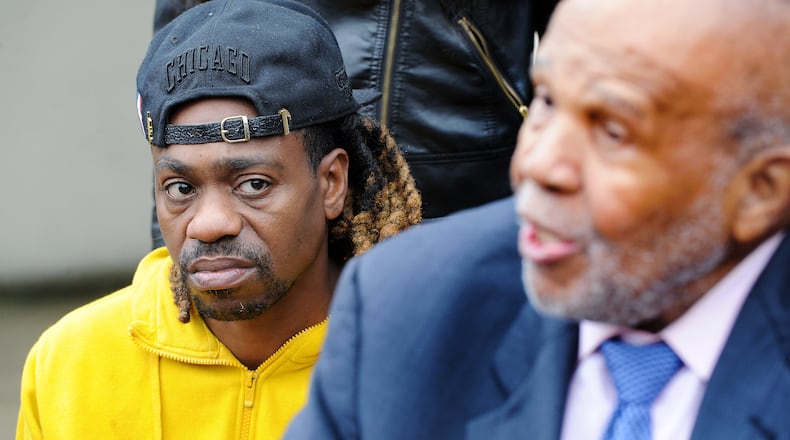Earlier this year, the city and the U.S. Department of Justice announced they had reached a settlement agreement over allegations that Dayton police discriminated against Owensby, who uses a wheelchair.
Owensby was shot in a liquor store in December 2018, suffering a fractured spine and damage to his lung, ribs, kidney and other body parts.
The Justice Department said its investigation “substantiated” that the police department provided Owensby with “unequal and ineffective” services by removing him without a mobility aid.
Dayton police Chief Kamran Afzal on Wednesday said in a prepared statement, “We acknowledge this incident was distressing for everyone involved. As previously announced, we will be modifying our policies and practices when removing an individual with mobility limitations from a vehicle.”
Afzal said the police department is partnering with Disability Rights Ohio to develop new training so officers have the best tools to serve the community.
The city did not admit liability as part of the settlement.
“While I believe that Dayton would have ultimately prevailed, litigation can be lengthy and unpredictable,” said Barbara Doseck, Dayton’s law director. “I believe this settlement is in the best interests of all involved.”
Owensby was forcibly pulled from his vehicle by officers Vincent Carter and Wayne Hammock during a traffic stop on Sept. 30, 2021.
In a deposition in February, Owensby said he was pulled over after visiting an apartment building on West Grand Avenue where he picked up some cable boxes from one of his rental properties.
Police told Owensby they wanted him out of the vehicle because they were bringing a police K9 to do a free air sniff to see if the dog alerted officers to the presence of drugs in the car.
Owensby told the officers he couldn’t get out of the vehicle because he’s paraplegic and he asked for the officers to call a “white shirt,” meaning a supervisor.
In a lawsuit against the city and the police officers, Owensby alleged the officers injured him when they pulled him out of his vehicle by his dreadlocked hair. He claimed they violated his rights by unlawfully arresting him and using unnecessary force.
In his deposition, Owensby said the officers were trying to yank him out of his vehicle and he was trying to tell them he needed assistance getting out.
He said he thinks the officers should have provided a wheelchair to help him out of the vehicle.
Following the traffic stop, Owensby was charged and eventually found guilty of window tint and child restraint violations, which were minor misdemeanors that resulted in about $300 in fines. A young child was in the back seat of Owensby’s vehicle.
In addition to a federal civil rights lawsuit, Owensby also filed a lawsuit demanding police return the cash they seized from his vehicle.
Owensby in his deposition said the cash was his savings and money he received from a federal paycheck protection program.
In a deposition from November 2022, officer Carter said he and his partner pulled over Owensby after being contacted by a detective who was monitoring a location that had activities that were consistent with drug sales.
Carter said the detective told him that people were coming and going from Owensby’s vehicle, which suggested potential narcotics transactions.
Carter said he believed the occupants of the vehicle might possess firearms because many people involved in the drug trade carry weapons.
Carter in his deposition said he ran Owensby’s information and learned he had multiple contacts with police related to gun and drug offenses.
The 33-year-old officer said he asked Owensby to get out of the vehicle, but he refused and he did not provide officers with any instruction on how they could safely remove him from the car.
“We gave Mr. Owensby multiple opportunities to let us help him out of the car,” said Carter, according to court transcripts. “He was being actively passive-aggressive, noncompliant, didn’t listen to any of our commands.”
Credit: Jim Noelker
Credit: Jim Noelker
Police searched Owensby’s vehicle but did not find a weapon or drugs.
An internal police investigation by the Professional Standards Bureau (formerly internal affairs) concluded that officers Hammock and Carter did not violate policy in pulling Owensby from the vehicle and given the level of force they used.
The investigation, however, concluded Hammock and Carter violated the department’s rules of conduct by silencing their body cameras at one point and also when Hammock made the comment — “Carter, why’d you beat that poor man up?”
Hammock and Carter were both issued training memos by the police department as a result of these findings.
This newspaper could not immediately reach Owensby, who recently became a pro se plaintiff in his civil litigation after his attorneys withdrew as his counsel.
Derrick Foward, president of the Dayton Unit NAACP, said in a statement that the organization applauds the police chief for taking steps to deal with the officers who violated department policies and standards. Foward said Owensby was a client of the Dayton Unit NAACP.
“While the city’s law director stated there was no admission of liability by the city, the six-figure settlement along with the city’s settlement with the U.S. Department of Justice says it all ... guilty,” Foward said. “Our hope is that the next aggressive behavior of these officers does not lead to a deadly encounter, but rather termination of employment.”
This is the second lawsuit the city has settled this year involving a person with disabilities.
In August, the city agreed to pay $45,000 to settle a lawsuit filed by Jack Runser. Runser, who is deaf, mute and has cerebral palsy, alleged that officers mistreated him when they stopped, questioned and handcuffed him and put in the back of a police cruiser and took him to the hospital.
About the Author




